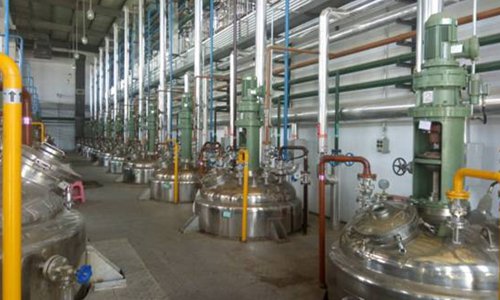


The artemisinin production line in Yuzhou Tianyuan Biotechnology Company in Central China's Henan Province. Photo: Courtesy of Institute of Process Engineering of Chinese Academy of Sciences
China has built the world's first large-scale production line for the anti-malaria drug artemisinin, and will introduce the production line to malaria-stricken African countries.
The production line adopted a new technology jointly developed by scientists from the Institute of Process Engineering of Chinese Academy of Sciences and Henan-based Yuzhou Tianyuan Biotechnology Company, has been successfully operated for a year in a plant of the company in Central China's Henan Province with an annual capacity of 60 tons.
Wang Hui, one of the key researchers of the technology from the institute, told the Global Times on Thursday that the new technology increased the annual capacity by up to four times comparing with traditional way of producing artemisinin.
Meanwhile, the new technology, based on recrystallization to extract pure artemisinin from herbs, increases the efficiency and purity and decreases energy consumption during production, while the traditional means are considered to be heavily polluting, according to the institute.
Down-stream products based on artemisinin have been sold to countries including India and Sudan, and the Tianyuan company has reached cooperation intention to help build a complete production line for artemisinin in Ghana, and guarantee the supply of raw materials of artemisinin, said Zhang Mei, one of the shareholders from the company, according to a press release the institute sent to the Global Times on Thursday.
Artemisinin, a high-efficient, safe and low toxic anti-malaria drug, has become the first choice for the international community in the treatment of malaria. The discovery of artemisinin won Chinese scientist Tu Youyou a Nobel Prize in 2015.
According to the latest World Malaria Report released by World Health Organization on November 19, 2018, an estimated 219 million cases of malaria occurred worldwide in 2017, and 15 countries in sub-Saharan Africa and India carried almost 80 percent of the global malaria burden.
The institute plans to introduce the technology to more African countries to accelerate elimination of malaria in the world and greatly reduce deaths resulted from it, said Zhang Suojiang, director of the institute who led the research.
Zhang told the Global Times that the plan is also in line with the Belt and Road Initiative.
 Fire brigade in Shanghai holds group wedding
Fire brigade in Shanghai holds group wedding Tourists enjoy ice sculptures in Datan Town, north China
Tourists enjoy ice sculptures in Datan Town, north China Sunset scenery of Dayan Pagoda in Xi'an
Sunset scenery of Dayan Pagoda in Xi'an Tourists have fun at scenic spot in Nanlong Town, NW China
Tourists have fun at scenic spot in Nanlong Town, NW China Harbin attracts tourists by making best use of ice in winter
Harbin attracts tourists by making best use of ice in winter In pics: FIS Alpine Ski Women's World Cup Slalom
In pics: FIS Alpine Ski Women's World Cup Slalom Black-necked cranes rest at reservoir in Lhunzhub County, Lhasa
Black-necked cranes rest at reservoir in Lhunzhub County, Lhasa China's FAST telescope will be available to foreign scientists in April
China's FAST telescope will be available to foreign scientists in April "She power" plays indispensable role in poverty alleviation
"She power" plays indispensable role in poverty alleviation Top 10 world news events of People's Daily in 2020
Top 10 world news events of People's Daily in 2020 Top 10 China news events of People's Daily in 2020
Top 10 China news events of People's Daily in 2020 Top 10 media buzzwords of 2020
Top 10 media buzzwords of 2020 Year-ender:10 major tourism stories of 2020
Year-ender:10 major tourism stories of 2020 No interference in Venezuelan issues
No interference in Venezuelan issues
 Biz prepares for trade spat
Biz prepares for trade spat
 Broadcasting Continent
Broadcasting Continent Australia wins Chinese CEOs as US loses
Australia wins Chinese CEOs as US loses